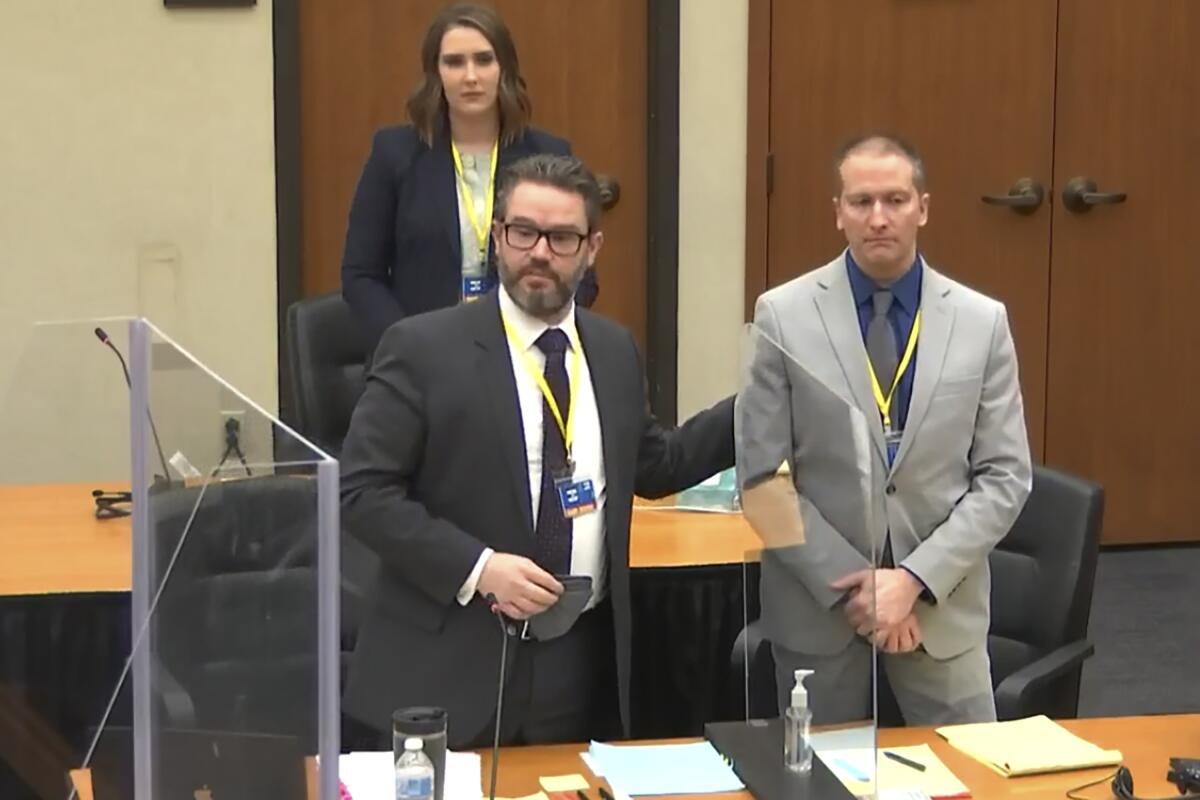Chauvin’s conviction is not our exoneration

- Share via
In considering the conviction of former Minneapolis Police Officer Derek Chauvin for second- and third-degree murder and manslaughter in the May 25, 2020, killing of George Floyd, we celebrate a system that we perceive to have worked in this case — but we must do so against a backdrop of thousands of other cases in which no one was called to account for police killings, disproportionately of Black people.
This case was so closely watched precisely because it was a rarity: a criminal trial of a police officer for unreasonable use of force that resulted in death.
The jury found that the officer acted so far outside the bounds of proper policing as to have committed crimes when he kneeled on Floyd’s neck for 9 minutes and 29 seconds. There will be attempts to read the result as some kind of vindication for American policing and our system of law, because it arguably demonstrates that good law enforcement agencies and good laws will ferret out and hold to account rogue officers. Such a reading would be tragically mistaken and no longer viable given where we are now, a year after Floyd’s death and the protests that followed.
Those demonstrations focused Americans’ attention on the racial inequities that endured decades after the end of racist laws meant to hold Black people apart and below white society. Some of those protests turned gratuitously violent, but that tragedy takes nothing away from the self-evident truths that have always been in front of our noses yet are too often ignored — that even though we profess that all men are created equal, we have built a society that dispenses unequal treatment by race and by class, especially in encounters with police.
Chauvin’s attorneys argued that the judge’s decision not to lock the jury away during the course of the trial was a fatal flaw that tainted the proceedings. But there was no indication that the fairness of the trial was undermined by an awareness of the world in which it took place. For too many years, denying the real world and the real conditions in which many Americans live and interact with police has not protected justice but has, in fact, brought us its opposite.
What was on trial was not merely one officer but the entire U.S. legal system and its ability to deliver equal justice in a nation built in part on the subjugation of Black people.
It is not naïve to believe that the legal system can deliver on that promise, and it is our duty to believe that it must — and to know that we have much work to do before it finally becomes the justice system we told ourselves it already was.
Chauvin’s conviction is less a victory or a vindication than an expression of faith — evidence of justice as yet unseen, but hoped for.
It would be foolish to take delight in the verdict, or in the criminal sanctions that Chauvin will face in eight weeks. We Americans collectively recruited, hired, trained, armed and paid him (and others like him) to do what he did, and we were fine with it, as long as we were spared the details.
But modern technology is putting the details before our eyes, whether we want to see them or not. It’s about time.
More to Read
A cure for the common opinion
Get thought-provoking perspectives with our weekly newsletter.
You may occasionally receive promotional content from the Los Angeles Times.










